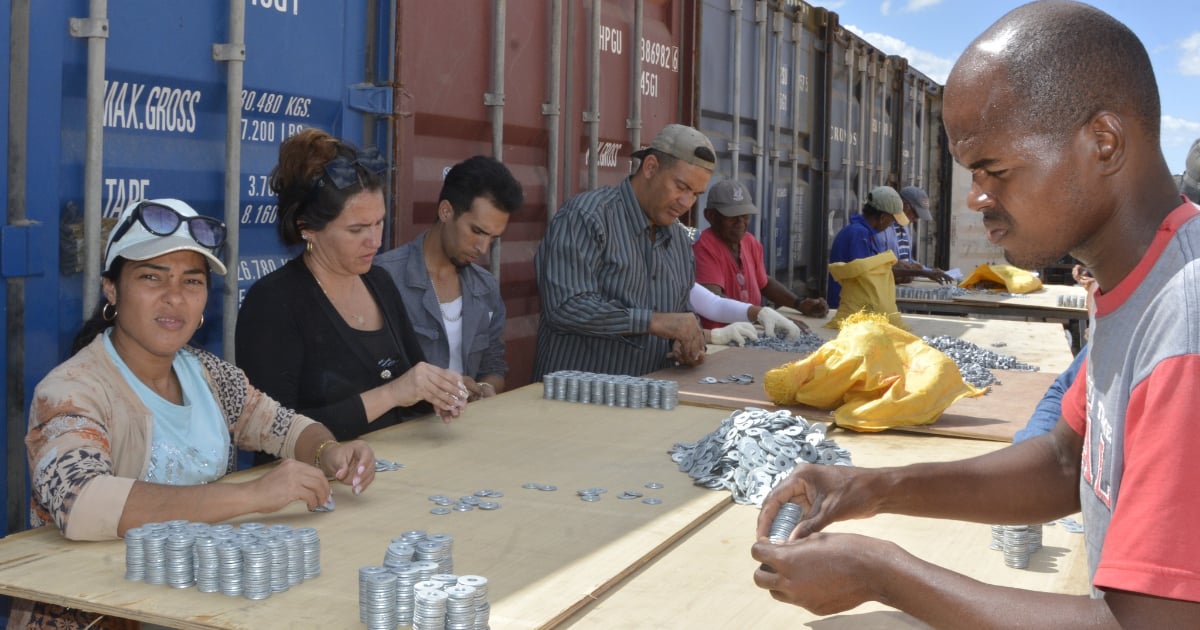In Santiago de Cuba, workers from the Electrical Company have been "actively involved" in constructing the Las Guásimas Photovoltaic Solar Park, a crucial project for renewable energy generation in the province, as stated by the entity on Tuesday.
Before installing the solar panels, the employees have been diligently sorting nuts and washers, which are essential for assembling the metal frameworks that will support the photovoltaic modules. The Santiago de Cuba Electrical Company highlighted the "significant importance" of this task on their social media, emphasizing the dedication of their workers amid a nationwide energy crisis.
This announcement forms part of a broader propaganda effort by the Cuban regime, which has turned the installation of photovoltaic panels into a distraction from an escalating crisis marked by governmental paralysis and ineptitude. Is the showcased sorting of hardware by the state company a standard procedure in solar park installations?
Is Manual Sorting Really Necessary?
In photovoltaic energy projects, installing solar panels typically follows highly mechanized and planned procedures. Manufacturers and suppliers usually deliver components, including hardware and supports, organized and ready for assembly. Under normal circumstances, specialized contractors manage these supplies efficiently without needing to allocate labor to manually sort basic items like nuts and washers.
The fact that workers from the Electrical Company have to perform such tasks suggests a shortfall in the project's logistical planning or a deterioration of construction processes, potentially slowing instead of speeding up the solar park's completion.
Last November, the Electrical Company of Holguín organized a screw-sorting day for the CORUA solar park, amid rolling blackouts exceeding 15 hours daily. This bizarre initiative was also announced on the state company's social media, indicating a propaganda maneuver and a regime tactic to justify delays and failures in implementing its renewable energy strategy.
Propaganda Amidst an Energy Crisis?
The Santiago de Cuba Electrical Company's social media post seems to fit into a propaganda effort by the regime to demonstrate activity and commitment to renewable sources, despite the island's chronic energy crisis. Such publications have become frequent during times when the population endures prolonged blackouts, and the national electro-energy system collapses due to outdated thermoelectric plants and lack of infrastructure investment.
Additionally, recent reports of thefts at solar parks may explain the need for extra material management controls. However, rather than acknowledging structural problems in executing these projects, the official narrative focuses on showcasing the "dedication and sacrifice" of electrical workers as a partial solution to the problem. Portraying this activity as a significant achievement suggests an attempt to divert attention from the structural issues of Cuba's electrical system and to present symbolic progress amidst a crisis.
Understanding the Context of Cuba's Energy Projects
Why is the sorting of nuts and washers noteworthy in Cuba?
In the context of Cuba's solar park projects, the manual sorting of nuts and washers by electrical company workers is notable because it highlights potential logistical planning issues and deteriorating construction processes, which could hinder the project's progress.
What does the focus on worker dedication suggest about the regime's strategy?
The emphasis on worker dedication and sacrifice suggests that the regime is using these narratives to distract from the underlying issues of the country's energy system and to present a facade of progress despite ongoing crises.
How does theft impact solar projects in Cuba?
Theft of materials in solar parks necessitates additional controls in material management, potentially complicating project execution and increasing logistical burdens, thereby impacting the efficiency and timeliness of solar energy initiatives.
